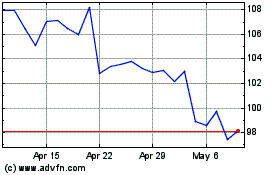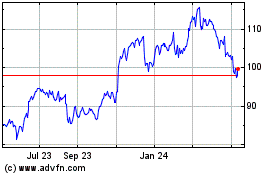Backlash Against Drug Prices Hit Manufacturers and Middlemen
October 28 2016 - 4:40PM
Dow Jones News
The backlash against the high and rising cost of medicines may
be cracking the foundation of the convoluted U.S. drug-pricing
system, hitting the bottom lines of manufacturers and industry
middlemen that have benefited from increases.
Shares of many drugmakers, wholesale distributors and
pharmacy-benefit managers were battered Friday on new evidence in
corporate earnings reports that drugmakers' ability to raise prices
has weakened. McKesson Corp., one of the largest wholesale drug
distributors, shed a quarter of its market value after disclosing
that competition and a slowdown in price inflation for brand-name
drugs would reduce its profits for its current fiscal year.
Amgen Inc. shares dropped 10% after the company late Thursday
flagged diminished pricing power next year for its blockbuster
rheumatoid-arthritis treatment Enbrel, after several years of sales
gains fueled by repeated price hikes. The Nasdaq Biotechnology
Index fell 2% Friday.
The prospect of price moderation—while good for patients and
insurers—spooked analysts and investors concerned about the profits
of drug companies and middlemen. "There is tremendous concern in
the marketplace about structural change to pricing," Goldman Sachs
analyst Jami Rubin said on a conference call with executives of
drugmaker AbbVie Inc. on Friday.
Drugmakers in recent years have repeatedly boosted prices for
many drugs at rates well above the broader rate of inflation, and
have introduced new drugs at prices that can top $100,000 a year
per patient.
The rising cost burden has triggered a backlash from patients,
doctors and insurers, who say the costs put drugs out of reach for
some patients and strain health-care budgets. High-profile actions
including Mylan NV's repeated price hikes for the emergency allergy
treatment EpiPen have triggered investigations by members of
Congress and the Justice Department.
Companies and organizations that pay for portions of their
employees' health care have become emboldened by the public
backlash and are pushing back against drug-price increases via the
pharmacy-benefit managers, or PBMs, that administer employee
benefits, said Ronny Gal, an analyst with Sanford C. Bernstein.
"There's just less money to go around," he said.
McKesson said it has been forced to lower the prices it charges
to independently owned pharmacies to match the prices charged by
competing wholesalers aiming to steal market share. "We have made a
very significant change in our pricing practice to match where the
market is today," McKesson Chief Executive John H. Hammergren told
analysts on a conference call on Thursday.
McKesson contracts with manufacturers to distribute drugs to
customers including retail pharmacies and hospitals. Some of its
contracts allow McKesson to benefit when manufacturers increase
prices, by selling its inventory of a drug at the new, higher
price. A slowdown in price increases is beginning to hurt its
profit margins.
McKesson's stock plunge on Friday erased about $9 billion in
market value, while shares of the company's main rivals,
AmerisourceBergen Corp. and Cardinal Health, declined 13% and 12%
respectively.
Drugmakers say they are facing more intense pricing pressure in
the U.S. this year in certain treatment areas. Novo Nordisk A/S's
American depositary receipts tumbled 13% after the Danish company
cut its 2016 sales and profit forecast, citing U.S. pricing
pressure primarily for its insulin drugs for people with
diabetes.
"The competitive environment in the U.S. within both diabetes
care and biopharmaceuticals has become more challenging, negatively
impacting the price of our products," Novo Chief Executive Lars
Rebein Sorensen said on a conference call with analysts.
Companies including Novo have actually boosted list prices for
insulin in the U.S. in recent years, but much of it has been
funneled back in the form of rebates to PBMs. Still, the increased
prevalence of high-deductible health plans means that some patients
must pay the full list price themselves for at least part of the
year.
The pricing pressure may now be hitting another lucrative class:
so-called TNF inhibitors, which treat rheumatoid arthritis and
other autoimmune diseases.
Amgen blamed softer pricing for Enbrel next year on the need to
pay higher rebates to the PBMs. Amgen said the higher rebates would
help ensure that drug plans continue to reimburse for patients' use
of Enbrel. "We'll be driving the business on volume, not on net
selling price next year," said Anthony Hooper, chief of Amgen's
commercial operations Thursday.
The concerns spilled over to Amgen's rival, AbbVie, whose drug
Humira is in the same category as Enbrel. AbbVie on Friday reported
lighter-than-expected sales of Humira for the third quarter. AbbVie
Chief Executive Richard Gonzalez told analysts there was little
change in the net price of Humira—after rebates and discounts—in
the supply contracts that AbbVie has negotiated with payers for
2017 and 2018, compared with this year.
AbbVie shares dropped 6.2%.
Jonathan D. Rockoff and Joseph Walker contributed to this
article.
Write to Peter Loftus at peter.loftus@wsj.com
(END) Dow Jones Newswires
October 28, 2016 16:25 ET (20:25 GMT)
Copyright (c) 2016 Dow Jones & Company, Inc.
Cardinal Health (NYSE:CAH)
Historical Stock Chart
From Mar 2024 to Apr 2024

Cardinal Health (NYSE:CAH)
Historical Stock Chart
From Apr 2023 to Apr 2024
